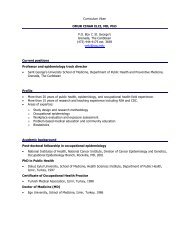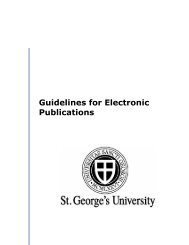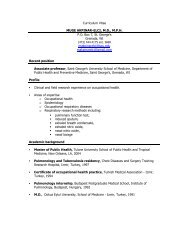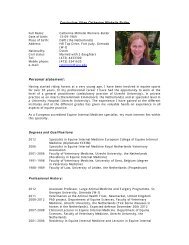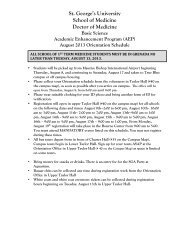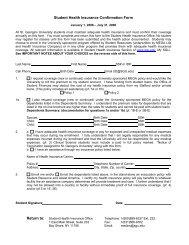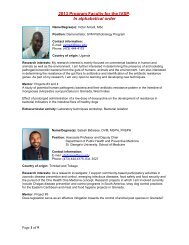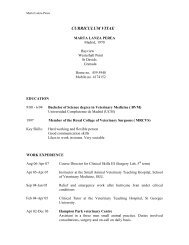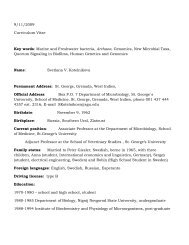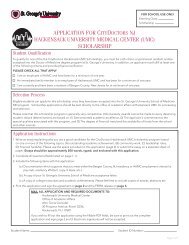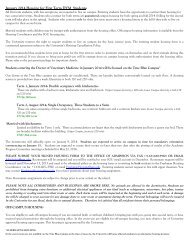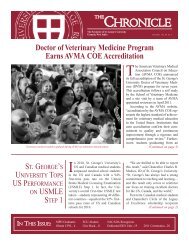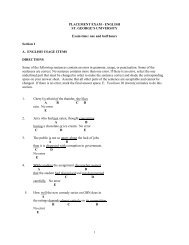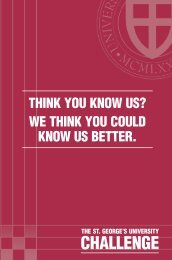SCHOOL OF 2012-2013 - St. George's University
SCHOOL OF 2012-2013 - St. George's University
SCHOOL OF 2012-2013 - St. George's University
Create successful ePaper yourself
Turn your PDF publications into a flip-book with our unique Google optimized e-Paper software.
presentations. Each student must give one presentation as<br />
well as serve as an audience member during other students’<br />
presentations and ask at least one question of each article,<br />
which they also have read. The course director chooses<br />
the level of complexity of the articles to fit the level of the<br />
individual student to reflect his/her level of education.<br />
SCSK 539<br />
Psychotropic Drugs and Drug Demand Reduction<br />
Dirk Burkhardt, MD<br />
<strong>St</strong>udents receive a primarily didactic orientation to drugs<br />
and are required to prepare and present educational<br />
sessions to secondary school students in Grenada. Phase<br />
One is composed of four (4) three -hour lectures given<br />
on four consecutive Saturdays from 9 am to 12 noon. The<br />
content of this Selective will cover the different types<br />
and families of psychotropic drugs, highlighting how they<br />
are administered or taken, their acute and protracted<br />
effects, including their neurobiological actions, their<br />
addictive potential, their lethal potential, their psychosocial<br />
consequences, and treatment and prevention implications.<br />
Phase Two requires students to prepare and present four (4)<br />
30–45 minute presentations to high school students on<br />
a schedule that the course directors will arrange to be<br />
convenient to both the students and the schools. Following<br />
the participation in the didactic sessions of Phase<br />
One, students will have to prepare four (4) PowerPoint<br />
presentations for high school students on some aspect<br />
of the topics taught. If the necessary permissions from<br />
the Ministry of Education cannot be achieved in time, the<br />
presentation will be held for the class. The presentations<br />
could be limited to one drug or category of drugs, or be<br />
even more comprehensive, depending on each student’s<br />
preference. They could focus on some particular aspect of<br />
the drug(s) such as effects, lethality, addictive potential, etc.<br />
The particular message chosen will be left to the student,<br />
each of whom will be expected to deliver four (4) such<br />
presentations to classes of students on different occasions.<br />
As noted, the schedule and venue of these sessions will be<br />
arranged by the course directors.<br />
SCSK 540<br />
Global Touch of Medicine<br />
David Holmes, BSc (Hons.), PhD, CSci, FIBMS<br />
Robert Hage, MD, PhD, DLO, MBA<br />
<strong>St</strong>udents in term one can register for this selective. It runs<br />
over three terms, two in Newcastle (Term 1 and 2) as part<br />
of the KBTGSP and one (Term 3) in Grenada. At completion<br />
of this selective you will understand why different systems<br />
have evolved and exist over time and interpret the pros<br />
and cons of each. While in the KBTGSP in Newcastle you<br />
will learn about the UK National Health System (NHS),<br />
then go on to learn about the Grenada health care system<br />
during your final year of basic sciences on the True Blue<br />
campus. The elements of this selective consist of: public<br />
lectures, seminars, active participation in research days,<br />
participation in health fairs and/or activities linked to<br />
charity organizations, and other activities by discretion<br />
of the course directors. Lectures and seminars usually<br />
are a one-hour activity and count towards one hour for<br />
the selective. Activities such as research days and health<br />
fairs add to half an hour for every two hours of active<br />
participation in the event. A log book must be kept by the<br />
student and should be signed off at every event. A total of<br />
15 hours is sufficient to be eligible for obtaining one credit<br />
for this selective. In closing the selective there will be a<br />
session where all participants give a short presentation of<br />
their experience to peers, faculty, and interested parties.<br />
SCSK 541<br />
Global Community Medicine<br />
Robert Hage, MD, PhD, DLO, MBA<br />
Nirupma Kakkar, MD<br />
This course consists of involvement with local charity and<br />
voluntary organizations, nursing homes, institutions for<br />
people with special needs, and health fair organizations.<br />
By engaging and interacting with the local communities<br />
and culture, both in the UK and Grenada, medical<br />
students are exposed, early in their careers, to the<br />
various social problems which impact on the health<br />
of the population. <strong>St</strong>udents gain insight into the<br />
organization and management of various social issues and<br />
resource implications thereof, as well as gain a greater<br />
understanding of how charity and voluntary organizations<br />
may prove valuable for research into social problems and<br />
issues, which in turn might have a significant impact on<br />
government policy and decision making.<br />
SCSK 542<br />
Membrane Biophysics and Electrophysiology<br />
Tuula Jalonen, PhD<br />
This selective introduces the basics of membrane<br />
biophysics specifically introducing electrophysiological<br />
methods for studying cell membranes, ion channels and<br />
receptors. The course will be evaluated based on joint<br />
School of Medicine<br />
Course Descriptions<br />
School of Medicine Catalog <strong>2013</strong>–2014 | 73



